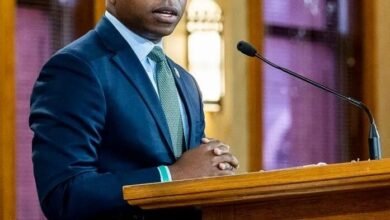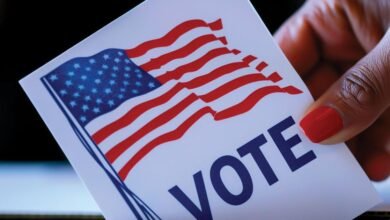Bloomberg News/Morning Consult Poll: Two weeks out, Trump and Harris are locked in a dead heat
With polling in swing states so close, the candidates enter the final weeks of the presidential election campaign scrapping for every undecided voter.
The presidential contest between Donald Trump and Kamala Harris could hardly be tighter.
The candidates are statistically tied among likely voters in each of the seven swing states in the Bloomberg News/Morning Consult poll, with the razor-thin margins in these battlegrounds underscoring how the final blitz of advertising, rallies and door-knocking campaigns could decide who claims the White House.
Across all seven states, the candidates are in a dead heat, with 49% support each among likely voters. The poll’s overall statistical margin of error is 1 percentage point.
The results point to a race that is anyone’s to win after a campaign season of unprecedented upheaval that included a change atop the Democratic ticket and two assassination attempts against Trump.
To move the needle, Trump’s campaign is aiming to mobilize voters who haven’t typically turned out, while Harris has recently looked to fire up women and pick off moderate Republicans who aren’t Trump devotees.
Harris outperforms her rival in the poll on some personal attributes that may help her with those disaffected Republicans. When asked which candidate is best described as mentally fit, honest and compassionate, swing-state likely voters chose Harris by wide margins. These voters were also more likely to label Trump dangerous. But the former president is seen as having strengths of his own, with more of these voters saying he is experienced, patriotic and a strong leader.
And when it comes to the issues, Trump holds an advantage on the most important one: the economy. Some 50% of swing-state likely voters say they trust him more to handle it, compared to 45% for Harris.
The vice president has fared better on this question than President Joe Biden did when he led the ticket, but she hasn’t fully erased Trump’s edge. That could prove a potentially crucial obstacle for her election bid. In a year of the Bloomberg News/Morning Consult poll, the economy has consistently ranked as swing-state voters’ top priority at the ballot box, with no other issue coming close.
A plurality of swing-state likely voters said they thought Harris would win the election, regardless of who they support — an assessment that comes after the Democrat has stepped up her media appearances with interviews on late-night television and with podcast hosts. Party heavyweights Barack Obama and Bill Clinton have recently hit the trail on her behalf, as have celebrities such as Usher and Lizzo.
Yet Harris’ unfavorability ratings among likely voters rose by 2 percentage points from September, hinting that those factors haven’t necessarily helped her candidacy — or have been offset by an onslaught of Republican attack ads.
Bloomberg News and Morning Consult have been collecting data on a roughly monthly basis since October 2023 about swing-state voters’ views of the presidential contest and economic issues. In that time, as inflation has cooled, swing-state voters’ perceptions of the economy has improved. About two-thirds of swing-state likely voters say the economy is on the wrong track, down 5 points from a year ago.
Poll respondents have consistently shown more optimism about their state and local economies than they do about the national economy. But that gap has slowly narrowed over the past year, suggesting that voters’ perceptions are starting to catch up to the conditions they see on the ground in their communities.
When it comes to prices, specifically, voters offer a sunnier picture from a year ago: Today, 64% of swing-state likely voters say they’ve seen price increases over the past month, compared to 77% who said the same a year ago.
But the biggest change in the race hasn’t been in the economy. It’s the candidates.
Since entering the fray in late July as Biden’s hand-picked successor, Harris has given the Democrats a boost. Swing-state voters approve of her proposals to crack down on price gouging, increase taxes on billionaires and expand the child tax credit. On every economic issue surveyed, Harris has closed the trust gap or even surpassed Trump as the candidate that swing-state voters trust more (and built on Biden’s advantage on health-care costs).
That has helped make for a tight contest between the candidates, with Harris touting ideas such as $25,000 in down payment assistance for first-time home buyers, while Trump pledges to enact new tariffs and promises to deliver a roaring economy. That may prove a potent closing argument: Some 52% of likely voters in the poll said their personal financial situations were better off under the Trump White House, compared to 34% of voters who said the same for the Biden administration.
Overall, Trump’s support has been remarkably consistent — never falling below 47% or rising above 49% among registered voters across the seven swing states in a year of the Bloomberg News/Morning Consult poll. The race, then, turns on Harris’ ability to grow her support, especially among the undecided voters who had been sitting on the sidelines while Biden was her party’s nominee.
She’s improved the Democrats’ position among Black voters, voters under 35 and lower-propensity voters who did not vote in the 2022 midterm election. She also has made gains with women, in part by emphasizing her support of abortion rights.
She’s made inroads among the so-called “double haters” — voters who have negative opinions about both Biden and Trump. When Biden was in the race, he and Trump each won about a third of those voters, with the rest undecided or staying home. Now, Harris leads Trump among those voters in swing states by 22 percentage points. The bad news for Harris is that among the new double haters — those with a negative opinion of her and Trump — she’s trailing by 18 points.
Methodology
The Bloomberg News/Morning Consult poll surveyed 5,308 registered voters in seven swing states: 915 in Arizona, 914 in Georgia, 756 in Michigan, 449 in Nevada, 755 in North Carolina, 866 in Pennsylvania and 653 in Wisconsin. The surveys were conducted online from Oct. 16 to Oct. 20. The aggregated data across the seven swing states were weighted to approximate a target sample of swing-state registered voters based on gender, age, children in household, race/ethnicity, marital status, home ownership, 2020 presidential vote, state and region within the state. State-level data were weighted to approximate a target sample of registered voters in the respective state based on gender, age, race/ethnicity, marital status, home ownership, and 2020 presidential vote. Likely voters were identified by asking respondents to rate their motivation to vote on a scale of 1 to 10; those answering 8 or above were considered likely voters. Likely voters totaled 4,979, including 861 in Arizona, 855 in Georgia, 705 in Michigan, 420 in Nevada, 702 in North Carolina, 812 in Pennsylvania and 624 in Wisconsin. For both registered and likely voters, the statistical margin of error is plus or minus 1 percentage point across the seven states; 3 percentage points in Arizona, Georgia and Pennsylvania; 4 percentage points in Michigan, North Carolina and Wisconsin; and 5 percentage points in Nevada.
Source link




